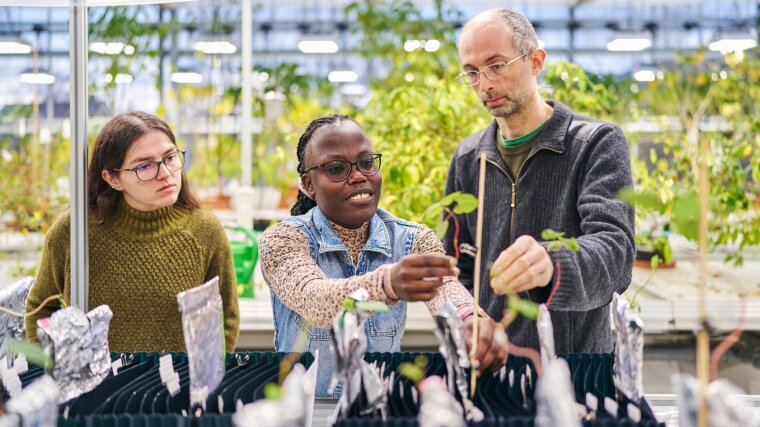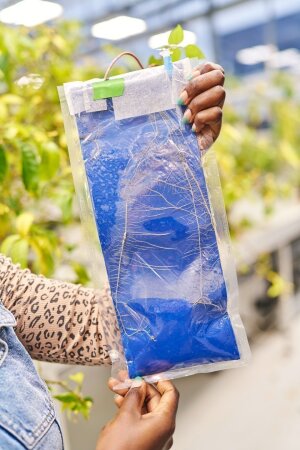
They are the silent directors, hidden in the ground beneath our feet: viruses—or bacteriophages, to be precise—have a vast influence on life, and not only below the ground. They orchestrate bacterial networksand stabilize ecosystems, which could enable them to shape the future of sustainable agricultural systems. A research team led by Prof. Dr Bas E. Dutilh is deploying cutting-edge methods to examine how these tiny actors function in ecosystems. Embedded in the Cluster of Excellence »Balance of the Microverse«, the team is investigating how viruses not only cause damage but also lay the foundations for diversity and balance.
By Juliane Seeber
The narrow zone of soil that surrounds plant roots is known as the »rhizosphere«. This area is a hotspot for countless microorganisms and is one of the most complex ecosystems on Earth. »In the rhizosphere around certain plants, we can observe a fascinating relationship: nitrogen-fixing rhizobia—a genus of bacteria—cooperate with leguminous plants to support their growth,« explains Bas E. Dutilh, Professor in the Cluster of Excellence »Balance of the Microverse« and Principal Investigator of the Viral Ecology and Omics (VEO) Research Group.
Plants are grown in pouches with a blue background so that their root nodules can be detected automatically.
Image: Anna SchrollInvisible architects of microbial networks
Angela Muraya, a doctoral candidate in Bas Dutilh’s VEO Group, is investigating the role played by bacteriophages in this harmonious, tri-partite interaction. »On the one hand, soilborne phages could influence which rhizobia are available for nodulation; on the other hand, the bacteria could find a sheltered refuge in the plant’s root nodules. As all of these aspects are evolvable traits, the resulting eco-evolutionary dynamics could impact plant growth and crop yields,« says the early career researcher, explaining the basic assumptions that underpin her investigations.
Rhizobia can repel phage attacks by developing resistance, but Muraya hypothesizes that this could lead to a loss of their ability to collaborate with plants. Muraya investigates whether and why this trade-off occurs and how the balance between phages, rhizobia, and plants can be maintained. Her goal is to better understand the genetic and biological processes influencing the delicate equilibrium in the rhizosphere.
Evolution in action
Bacteriophages are true masters of adaptation. In laboratory experiments, some phages have demonstrated a remarkable ability to switch to a new host: after just a few evolutionary cycles, they can successfully infect hosts that had previously been resistant. Yet, not all phages have this ability.
Wallapat Phongtang, another doctoral candidate in Bas Dutilh’s VEO Group, is researching the origins of this evolvability—that is, an organism’s ability to induce changes to its characteristics through alterations to its genes. »We hypothesize that phages may differ in their ›Host Switching Potential‹ due to specific genomic traits, and in my project we have developed methods to quantify this ability,« Phongtang says.
The researchers hope their work will provide a window into the world of these evolutionary dynamics. »Are there genes or other mechanisms that enable phages to expand their host range? To what extent do these mutations target specific genomic regions? How do bacterial communities change when phages expand their host range?« says Phongtang, listing the questions explored in his research. These insights will be decisive, he says, to improving our understanding of the role phages play in ecosystems, and could present interesting opportunities for biotechnological applications.
High-tech approaches to phage research
Another member of Bas Dutilh’s VEO Group, doctoral candidate Natia Geliashvili, relies on innovative technologies in the field of synthetic biology to trace phage lineages in complex microbial communities. Applying genetic markers and protein tags, researchers can »label« phages in ecosystems and then observe them directly.
Natia Geliashvili works with special methods to produce labelled phage mutants in cell-free systems. This means that she can ‘boot’ phages directly from synthetic DNA in the laboratory without the need for living cells as hosts. This approach allows phages to be flexibly designed and modified in order to better understand their properties and behaviour. By combining these modern technologies with evolutionary experiments, the VEO Group is opening up exciting new ways to explore the world of viruses and their ecosystems in more detail.
Phages as sustainable assistants
The findings of these studies could revolutionize our understanding of microbial ecosystems and lead to practical applications. For instance, targeted phages could be deployed in agriculture as a means of controlling pathogenic bacteria and sustainably enhance plant growth. By the same token, these studies provide crucial insights into maintaining the stability and health of soil ecosystems.
